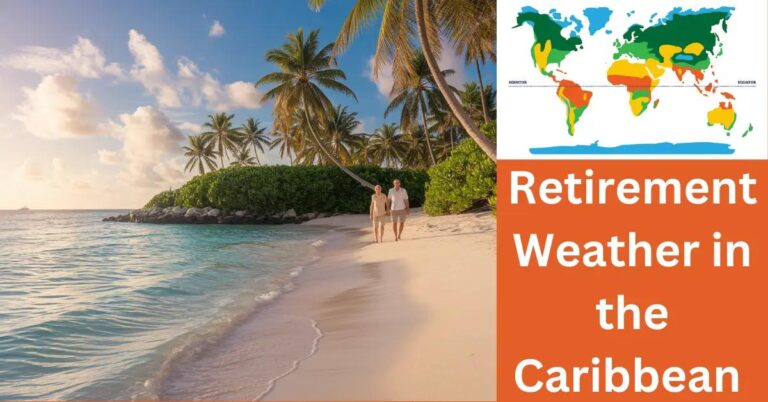TL;DR:
- Rainy seasons impact retirement plans by affecting daily life and travel; places like Florida experience blocked roads, while Tuscany sees shorter outdoor trips.
- Tropical climates offer warmth and affordability but require adaptation to rain and humidity.
- Visit retirement destinations during dry seasons for fewer crowds and better prices; use local guides for timing.
- Suitable rainy-day activities include visiting museums, enjoying local cuisine, and engaging in indoor hobbies.
- Prepare for rainy weather with emergency kits, insurance, and home maintenance; understand local safety protocols.
- Joining expat forums and local communities helps integration and support.
- Choose accommodations with weather-resistant features and consider coastal vs. inland climate preferences.
Rainy seasons can make or break your retirement dreams if you're not prepared. Will a downpour disrupt your travel plans, or will it add a refreshing twist? In “Rainy Seasons in Retirement Spots: What to Expect?”, I explore how weather impacts your retirement destination choice. We'll dive into when to travel, where to go, and how to adjust your lifestyle. Don’t let a few clouds rain on your parade—let’s find the silver lining together!
What are the Effects of Rainy Seasons on Retirement Plans?
Rainy seasons can change your retirement plans in many ways. If you dream of moving to a new place, consider how rainy season effects might change your daily life. In the USA, places like Florida have rains that may block roads or limit beach days. Meanwhile, in Europe, places like Tuscany may see shorter trips to outdoor vineyards.
How big a factor is the weather? Pretty big, but not in all ways! You need to plan for it. If a monsoon season hits, it could shuffle travel plans. You might miss flights or deal with sudden changes. Your comfort depends on picking the right times.
For example, traveling during dry months means more fun in the sun. Avoid planning trips in peak rainy months, as it might limit your leisure every day. Keep a flexible schedule to avoid challenges. This might even save you money since rainy seasons often have lower travel costs.
Each retirement spot is unique in seasonal weather patterns. If a place rains too much for your liking, you can choose one with mild or dry seasons. Many areas around the world offer balanced weather cycles. Look at climate maps to find a spot that matches your needs.
Living in a rainy spot might change daily plans, but it creates chances to relax and adjust. Some people grow to love the rhythm of the rain. You may have fun finding new indoor hobbies and exploring markets and local culture. In rainy areas, you can delight in cozy moments at home too.
How Do Tropical Climates Influence Retirement Living?
Living in a tropical climate can be a dream. The warm weather, lush greenery, and vibrant culture can be appealing. But, how does one choose a retirement destination with climate change in mind? Tropical areas often face challenges such as heavy rains and humidity. However, they also offer many benefits and can be great affordable retirement locations.
First, let's look at the advantages. Tropical climates usually offer beautiful natural settings. The warmth helps many retirees feel more active and cheerful. There's no snow to shovel, and beaches are often nearby. In addition, cost of living variations can work in your favor. During rainy seasons, living costs often drop. Less demand from tourists means lower prices on essentials and housing.
Living in a tropical climate means adapting to wet weather. Expat living tips can help. Use breathable clothing to stay cool and dry. Install dehumidifiers to keep your home comfortable. Participating in rain-friendly hobbies is also key. Try indoor activities like painting, yoga, or pottery. Many retirees find joy in learning new skills and meeting friends through these hobbies.
Managing affordability and lifestyle balance is important, too. Keep a budget and stay aware of cost changes during the rainy season. This will allow you to enjoy your retirement without stress. You can also reap the environmental benefits of living in humid areas. Plants thrive, and cleaner air improves health.
Finally, incorporating eco-friendly practices into daily life can make a big difference. Collect rainwater for plants and use solar power if possible. Living sustainably helps you and the planet. For more on how to enjoy a tropical retirement spot, check community forums and expert advice.
When is the Best Time to Travel to Retirement Destinations?
Choosing when to visit a retirement spot depends on weather. The ideal time varies by location and your weather preference. To avoid heavy rains, consult local travel guides. These guides can reveal when dry seasons occur, helping you plan. They provide insight into seasonal weather patterns at various destinations.
Once, I planned a trip to a popular retirement spot during the monsoon season. It rained so much, I couldn't go out for days. Now, I avoid peak monsoon months for smoother travels. Doing research and using travel guides can make your visit better.
By focusing on off-peak seasons, retirees can also gain other benefits. Travel during less busy times often means fewer crowds and lower prices. This is especially helpful for those on a budget. Just think of the peace and savings you gain by being a step ahead.
Tracking climate data for your destination is crucial. Analyze weather charts to time your trip perfectly. This data prevents mistakes, like rain-filled vacations. For cost-effective travel deals, look when others don't book trips. Flights and accommodations are often cheaper then.
Choosing warm and dry places also improves retirement living. For those seeking the best spots, consider low-tax areas too. Combining good weather and smart financial decisions can increase life quality. Retirement is a time to enjoy and explore. Understanding these factors lets you choose the best destination for your golden years.
What Activities Are Suitable During Wet Weather in Retirement Spots?
Rainy days can be cozy and fun. Think about all the things you can do while it rains outside. First, visiting indoor attractions is great. Many towns have museums that showcase local history. Here, you can learn new things without getting wet. Art galleries also offer a nice break from the rain. They house beautiful pieces that lift your spirits.
If you're looking for something more lively, consider cultural festivals. These events often happen during the rainy season. Festivals bring people together to celebrate with music, dance, and stories. They show the vibrant culture of the place. Joining in can be fun and a good way to meet new friends.
Food lovers will enjoy this time too. Rainy days are perfect for trying local cuisine. Many places have special dishes for wet weather. Warm soups and spicy foods might be on the menu, giving you comfort and warming you up. Sharing these meals with friends in cozy restaurants enhances the rainy season.
While the rain falls, you can also discover new hobbies. Rain-friendly activities like painting, knitting, or reading can be enjoyable. These pastimes help you relax and make the rainy days feel special.
On rainy days, think about wellness too. Retreats offer lush environments perfect for yoga or meditation. These spaces let you focus on your well-being, providing peace and quiet.
Social gatherings can continue in covered spaces like community centers. Hosting events here keeps the fun going, rain or shine. It's a wonderful time to bond and enjoy stories and laughs with friends. When the rain pours, there are still many ways to have fun and make memories.
How to Prepare for the Rainy Season in Retirement Destinations?
The rainy season can be challenging in retirement spots. Let's talk about how to prepare.
How big a factor is the weather? The weather strongly impacts daily life and safety in rainy places. Knowing your destination's weather patterns will help you stay prepared.
We need emergency kits in case things go wrong. Essentials include flashlights, water, non-perishable food, and first-aid supplies. It's crucial to make evacuation plans with your neighbors or community.
Understanding insurance is vital too. In flood-prone areas, you might need special coverage. Check with insurance agents to ensure your home is protected against flood risks.
Don't forget to pack for the weather. Raincoats, waterproof shoes, and umbrellas offer comfort during heavy rain.
House care is another concern. Make sure gutters are clean, windows are sealed, and roofs are checked regularly. These actions keep the home dry and comfortable during wet months.
Local safety rules are important. Get to know evacuation routes and emergency shelters. Local community support networks help keep everyone safe during emergencies.
Weather-ready home features can make a big difference. Consider installing storm doors, sealant around windows, and other weather-resistant enhancements.
Lastly, think about building a network of friends who can help during storms. Knowing who to call when you're in danger is one of the best safety measures.
This preparation will ensure that you enjoy your retirement destination, rain or shine. Embracing the wet season with planning and teamwork can lead to lifelong friendships and unforgettable retirement experiences.
Where to Find Expat and Community Support in Rainy Climates?
Finding community support is key when living in rainy climates. I recommend joining expat forums to connect with others like us. These forums are treasure troves of advice and friendships waiting to happen. We can discuss tips for surviving rainy days, share our experiences, and find support when we need it the most.
Integrating with local communities enhances our new lives. Volunteer opportunities are a great way to meet both locals and fellow expats. Whether it's helping at a local school or joining community clean-up efforts, giving back bonds us with others.
Meeting local expats and building connections is crucial. Attend workshops and community events; they are fun and provide learning through hands-on activities. Cultural festivals and fairs are exciting ways to learn local traditions and make new friends.
Building a support network in our new home is important. We face new challenges like adjusting to local habits, food, and weather patterns. Some cultural adaptation challenges might feel big. But trust me, having friends who understand makes it easier.
Choosing a retirement destination must consider the threat of climate change and mountains. We seek areas where climate temperatures remain mild despite rainy periods. Mountain regions often offer shelter from harsh weather, making them attractive for retirees.
Navigating cultural adaptation is a journey, not a one-step process. Be patient, participate actively, and embrace differences. Little by little, we integrate and feel happier about our choice in retirement location. Let each raindrop remind us of new beginnings and connections we are making in our new home.
What Types of Accommodation Are Best for Rainy Seasons?
When choosing a home for retirement in rainy areas, finding the right type of accommodation is key. Look for weather-resistant homes that can handle heavy rain. These are often designed with sloped roofs and strong drainage systems.
In humid regions, property maintenance becomes a top priority. Regular upkeep prevents rain-related issues like mold. Homes with materials and designs that fight moisture can make all the difference.
Different accommodation styles can offer varied benefits in rainy climates. Apartments may offer convenience and less outdoor maintenance. Standalone houses might provide more space and gardens, but they require more work to manage in wet weather.
Are you thinking about coastal versus inland retirement spots? Coastal areas often have more humidity, while inland areas can be dryer. Properties in these zones may have different maintenance needs because of climate differences.
Looking for walkable, active communities? Walkable, active communities that offer mild weather can be found across the US. Here, urban planning often considers pedestrian pathways and easy access to essential services, which is great for retirees.
Do you wonder where the best places are to retire with little humidity? Some inland areas in the US or regions at higher altitudes may offer drier conditions. This creates a more comfortable environment for those who don’t like too much moisture.
Navigating the real estate market for rainy regions needs some research and planning. Consider cost-effective solutions to address seasonal changes in the environment. Knowing what type of property suits your preferences and needs can lead to a happy, dry retirement!
Choosing the right accommodation ensures a comfortable life despite the rainy seasons. Take your time to explore these options for a satisfying retirement.
Conclusion
To wrap it all up, wrapping our heads around rainy seasons is smart. Some places get super wet. Pick travel times wisely and dodge monsoons. Cost checks matter when choosing the tropics. Rain-friendly hobbies might brighten gloomy days. Local culture and festivals add spice to the experience. Safety plans should be tight. Speak with local expats and communities for a smoother switch. Homes need to withstand rain. Weather-resistant upgrades can save cash in the long run. Your new life should bloom, rain or shine, with these tips!












